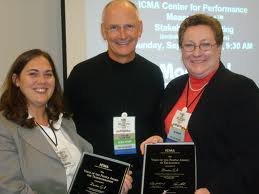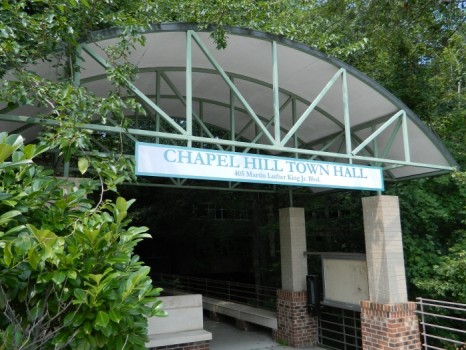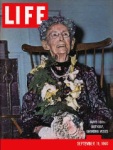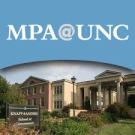 In a way Cal Horton introduced several ELGL members (Heather Martin, Kent Wyatt, and Kirsten Wyatt) to the world of local government in Oregon. While first year students at the UNC MPA program, we signed up for a City Management class taught by Cal Horton, Chapel Hill town manager (at the time) and David Ammons, UNC Professor of Public Administration and Government. David and Cal tailored the class around Playing with Fire written by Sandy city manager Scott Lazenby. Our assignment for each class was to read a few chapters of the book and to come prepared to discuss the issues facing Ben Cromarty, the mythical city manager of Trillium, Oregon. It was through the class discussions on Playing with Fire where we gleaned an insiders look into city management .
In a way Cal Horton introduced several ELGL members (Heather Martin, Kent Wyatt, and Kirsten Wyatt) to the world of local government in Oregon. While first year students at the UNC MPA program, we signed up for a City Management class taught by Cal Horton, Chapel Hill town manager (at the time) and David Ammons, UNC Professor of Public Administration and Government. David and Cal tailored the class around Playing with Fire written by Sandy city manager Scott Lazenby. Our assignment for each class was to read a few chapters of the book and to come prepared to discuss the issues facing Ben Cromarty, the mythical city manager of Trillium, Oregon. It was through the class discussions on Playing with Fire where we gleaned an insiders look into city management .
One of the drivers behind the creation of ELGL was a lesson learned in Cal and David’s class which was the importance of developing a professional network of at least five others who you can call on at any time. ELGL challenges each of you to think about whether you have this network in place, and what you can do to make it stronger.
We caught up with Cal (who is living in Arizona) to reflect on his tenure in Chapel Hill, his career progression in local government, and his life after city management.
The Takeaway with Cal Horton

Experience: Retired, Chapel Hill town manager; Decatur, Georgia assistant city manager; Chapel Hill director of public safety; and City of Charlotte, intern
Education: University of North Carolina at Chapel Hill
Background Check
As Chapel Hill’s longest-serving town manager, Cal Horton was considered the ultimate professional, personifying the craft of town manager as a noted champion and advocate for town employees, a trusted advisor for the council, and a voice of reason for the community.
After graduating from the University of North Carolina (UNC) at Chapel Hill in 1968, he served as assistant city manager in Decatur, Georgia, while pursuing his MPA. He returned to Chapel Hill in 1989 as director of public safety; a year later, he was appointed town manager. During his tenure, he created an organizational culture that encouraged open communication, and he established several forums for employees. A tireless mentor for both MPA students and town interns, he also helped to initiate the Professional Partners Program of the North Carolina City and County Management Association (NCCCMA).
 Mr. Horton was president of the Georgia City and County Management Association, the NCCCMA, and UNC’s MPA Alumni Association, which honored him as one of only four recipients of its Distinguished Public Service Award. He also served on the Georgia Municipal Association’s board of directors and on numerous committees within ICMA. In 2002 Mr. Horton became an ICMA Credentialed Manager.
Mr. Horton was president of the Georgia City and County Management Association, the NCCCMA, and UNC’s MPA Alumni Association, which honored him as one of only four recipients of its Distinguished Public Service Award. He also served on the Georgia Municipal Association’s board of directors and on numerous committees within ICMA. In 2002 Mr. Horton became an ICMA Credentialed Manager.
When he retired in 2006, the Chapel Hill community established the Annual Cal Horton Municipal Service Award to recognize a town employee dedicated to “the highest ideals of public service.” He was also selected as one of “Fifty Who Made a Difference: Chapel Hill– Carrboro’s Top Fifty Leaders of the Last Fifty Years.”
Q & A
Reflecting on your career, identify the three accomplishments that you are most proud of.
I probably would list three different things if asked to do this again a month from now.
Leading a collaborative team of employees, public officials, and community leaders in recovering from Hurricane Fran and other extreme weather events in Chapel Hill, North Carolina.
Town employees in Chapel Hill always were at their best when they were needed most. They led the way to reestablishing a sense of normalcy by restoring order and services. For example, police officers and fire fighters completed an initial community conditions surveillance only a few hours after Hurricane Fran destroyed the Town’s communications and power systems and blocked most streets with debris from over 10,000 felled trees. Public works crews were clearing streets to restore mobility even before the last winds of the storm were over. Sanitation workers collected refuse from 97% of all residential service routes only three days after the storm struck. Other Town employees climbed over debris fields and went door-to-door handing out leaflets to inform residents of emergency communication procedures.
Chapel Hill public officials, both elected and appointed, were practiced in the art of intergovernmental politics, because of the Town’s role in initiating and providing regional services. The regular communications that we maintained with each other created a sense of connection and an ease of collaboration that paid off with excellent joint work during times of crisis.
Working with a truly collegial group of professionals in Decatur, Georgia, to restore the community’s sense of psychological identification by rebuilding public infrastructure, eliminating blighted housing, providing excellent city services, and promoting economic development.
Historically, Decatur was the nearly all-white home of DeKalb County’s privileged leadership, with the best public schools in Georgia, a very good housing stock, and excellent public services. However, turmoil came with desegregation of housing in the 1960’s. Over a decade, the community deteriorated socially and economically. Racism was a major factor in the decline of housing values throughout much of the City, and federal housing policies that provided easy loans to persons with marginal incomes also played a role. There was little investment in public facilities. By 1974, over 150 homes had been abandoned, the City’s population had declined, and businesses were closing. Decatur was near the failure point.
 Things began to change when a new community leadership group emerged, composed of longtime residents and newcomers, both Black and White. The City Commission hired a new manager, Curtis Branscome, and he assembled the most collegial core staff with whom I have ever worked, including Hugh Saxon, Lynn Menne, Peggy Merriss, and me, as well as Curtis.
Things began to change when a new community leadership group emerged, composed of longtime residents and newcomers, both Black and White. The City Commission hired a new manager, Curtis Branscome, and he assembled the most collegial core staff with whom I have ever worked, including Hugh Saxon, Lynn Menne, Peggy Merriss, and me, as well as Curtis.
Over the fifteen years that I was part of the team, we reinvented Decatur by: providing the best public services in the Atlanta metropolitan area; rehabilitating whole neighborhoods through code enforcement, Urban Homesteading, and federal housing improvement grants; taking risks with public money to spur new downtown development; promoting the city through numerous festivals and special events; and, branding the City with a unique logo and marketing program that won public and private sector awards. The work was worthwhile, exciting, and consuming; it produced both tangible and intangible results. And, we did it all together, as a true collegial team.
Working with the Equal Employment Opportunity Commission to establish a voluntary compliance program in Charlotte, North Carolina.
When the Equal Employment Opportunity Act of 1972 amended the Civil rights Act of 1964 to cover public employers, some local governments in North Carolina were slow to respond. My boss, Personnel Director Bob Earle, saw it as an opportunity and started moving us toward compliance, even though he knew that there would be resistance from some department heads, employee leaders, and Council Members.
At his urging, I learned everything I could about the new rules of the game. I met a key member of the Equal Employment Opportunity Commission staff, Eliza Paschall, at an educational conference sponsored by the EEOC. She was willing to work with us to help the City attain voluntary compliance with EEOC regulations.
Over the next year, we reviewed our entire human resources management system – every form, every rule, every process, every detail, in every department – to determine changes necessary to comply with the law. We made all the changes requested by the EEOC. We also started programs to change organization culture, with strong backing from City Manager David Burkhalter.
The work done with the EEOC was important as a device to initiate significant positive changes in the City of Charlotte, making it a national leader in the pursuit of real equal employment opportunity for all people.
Talk about two of the most difficult situations you confronted as a city manager.

The most difficult situations I confronted as a city manager all involved people who still are living and who would be hurt, embarrassed, or angered by any description of the events that was accurate enough to be instructive. I choose not to answer this question.
However, at the second tier of difficult situations, I would cite the several year period in which I worked with a Council that was split 4-1-4 on almost every significant issue or policy that came before it. It was made even more difficult by the propensity of some members to harshly criticize others in news media and at council meetings, to the point of being obviously disrespectful.
The challenge to me was to work for the Council as an institution, ignoring the split and the occasional unfortunate behavior of individual members. In doing so, my recommendations usually disappointed at least four of them and frequently made some of them angry, leading to public criticism of “the manager.”
Eventually, most of the Council Members understood that my opinions and recommendations had nothing to do with them and their views, that I was simply offering my best advice to the Council as a body, without regard to how well or how poorly it would be received by any individual or group of members. Things were better after that.
If you were putting together your ultimate mix tape, what songs would be on it?
I am certain that this list would be different next week, next month, and next year. Nevertheless, here is today’s set.
- Dr. John and the Dirty Dozen Band: “It’s All Over Now”
- Astrud Gilberto: “The Girl from Ipanema”
- Lyle Lovette: “If I Had A Boat”
- Mavis Staples: “Hard times Come Around No More”
- Lady Gaga: “Born this Way”
- California Guitar Trio: “Merry Christmas Mr. Lawrence”
- Randall Thompson: “Frostiana: The Road Not Taken”
- Aerosmith: “Walk this Way”
- Patsy Cline: “Crazy”
- Pink Martini: “Donde estas, Yolanda?
- Bette Midler, “Do You Want To Dance”
- John Lee Hooker: “Boom Boom”
- Opera Babes: “Beyond Imagination”
- Michael Jackson: “Thriller”
- Dave Brubeck Quartet: “Blue Rondo A La Turk”
- Aaron Copland: “Fanfare for the Common Man”
- Arlo Guthrie: “City of New Orleans”
- Bruce Springsteen: “Hungry Heart”
- Natalie Dessay and Delphine Haiden: “Dome Epais (Flower Duet)”
- The Eagles: “Peaceful Easy Feeling”
- Glenn Miller: “In the Mood”
- Rene Fleming: “Mio Babbino Caro”
- Otis Redding: “Sittin’ On the Dock of the Bay”
- Louis Armstrong: “What a Wonderful World”
You once co-taught a city management class with David Ammons. One of the things that stuck with me is when you stressed the importance of building a tight professional network of peers who you can turn to during any situation. Who was in your network?
www.mpa.unc.edu/files//Hayman.jpg?1311949623″ width=”120″ height=”180″ />I was fortunate to have a significant mentor throughout my entire career, Donald Hayman, of the University of North Carolina Institute of Government.
In Chapel Hill, I had excellent relationships with neighboring managers, especially because we frequently worked together on intergovernmental matters. John Link, of Orange County, and Bob Morgan of the Town of Carrboro, were good partners and always honest advisors.
In Decatur, the core management group described earlier, along with the minister at my church, constituted my “go to” group.
In Charlotte, I was a member of a group of young professionals who relied on each other for brutally honest feedback, especially after a few beers.
Seeing that your license plate is “UNC-MPA” you clearly hold Chapel Hill close to your heart. Tell us about the skills that you learned from the MPA program that contributed to your career.
I began learning how to discover, examine, articulate, and consistently apply personal values. That skill set served me throughout my career.
Many MPA programs including UNC offer an online component. What are your thoughts about pursuing an online MPA?
Online MPA programs meet an essential need, serving people who otherwise would have no opportunity to obtain an advanced degree in public administration. Many people cannot afford to lose pay, lose benefits, and bear the cost a graduate education at the same time. Online MPA programs and programs that provide a combination of short on-campus experiences along with online courses are critically important, in my opinion.
Since many of us may never have a chance to retire, what were the events or thoughts that you faced in deciding to retire?
I would not be so pessimistic about retirement. Set financial goals, invest consistently, and never touch the money. Most important of all, fight for the return of employer-sponsored pensions!
I retired because Ginger (my wife) and I could afford it financially, because we were emotionally ready for it, and because Chapel Hill was in great condition. I was tired of editing draft agenda items on weekends. I wanted to lead a normal life, and I knew that meant moving. And, I didn’t want to “die in the saddle,” missing all the freedom of retirement.
I continued part-time teaching for two years after retiring as Town Manager, and took some courses at the University. It made for a good transition.
(Complete the sentence) Before I die I want to…

I have never had an answer for this question.
Anna Mary Robertson Moses, aka Grandma Moses, a once prominent outlier artist, gained fame after she was well into her 70’s. She once said: “I look back on my life like a good day’s work. It was done and I feel satisfied with it. I was happy and contented. I knew nothing better and made the best out of what life offered. And, life is what we make it. Always has been, always will be.” I agree with Grandma Moses.
Let’s assume you didn’t grow up dreaming of becoming a city manager; what was your dream job as a child? How did you end up in local government?
I took a course in municipal government from Donald Hayman when I was a junior in college. Part of the course involved our class preparing a mock budget for the City of Charlotte, conducting research on site with several departments, and making a budget presentation to department heads as if they were the Council. It was interesting. That summer, Charlotte offered two undergraduate internships. I got one of them, Curtis Branscome the other. The City Manager, Bill Veeder, made sure that we had a good experience. We were hooked for life.
Make us jealous – walk us through a typical day of retirement.

One of the best things about retirement is that there is no typical day. But, I can give you an overview of some days that occur regularly.
No alarm clocks most days. We get up when the sun wakes us up. Check on the birds in the back yard feeding habitat that we have created. Bring in the newspapers to read with breakfast while we listen to NPR.
Email correspondence with friends, colleagues, and former students. Skim newsletters, bulletins, and online newspapers. Continue work on a collection of stories about growing up and family life that I am writing for my children and grandchildren. Continue genealogy research. Work on organization of family papers (I am the custodian of three generations of family documents and memorabilia).
Some days Ginger and I visit art galleries or take in new museum exhibits. Other days, we go exploring on the back roads of Yavapai County, with occasional hikes. Each week, we eat at least one breakfast, one lunch, and one dinner at local restaurants.
 On Mondays, I work as a volunteer for the U.S. Forest Service, removing target debris from shooting areas in the Prescott National Forest. On Saturdays, I work as a volunteer for the Highlands Center for Natural History, cleaning the Center building. Ginger and I do occasional volunteer work for other organizations.
On Mondays, I work as a volunteer for the U.S. Forest Service, removing target debris from shooting areas in the Prescott National Forest. On Saturdays, I work as a volunteer for the Highlands Center for Natural History, cleaning the Center building. Ginger and I do occasional volunteer work for other organizations.
We travel more than two months each year, usually a few long trips and multiple short ones. I enjoy doing the research for detailed trip plans.
We watch two evening news reports. I watch movies while Ginger watches sports. And, I read for hours almost every day, fiction, nonfiction, news magazines, and archaeology journals. Often, with a glass of wine handy.
ELGL is hosting its first annual conference next October; help us out by suggesting three topics or speakers that we should include.
- Water Wars in the 21st Century: Who will win? Who will lose? How will our culture change?
- Reestablishment of the Middle Class: How did so many of us become so poor in dollars and spirit? How can we stop the incredible shrinking of the middle class and create a better country?
- Three Amazing New Technologies and How They Will Dramatically Change Our Lives.
- How College Students became Indentured Servants of America’s Banking System: An examination of the impact of student debt and its effects on society. How in the hell did we get in this mess and how do we get out?
Ever consider running for elected office?
No. Never. Not even imaginable! I know of very few examples of former career managers being successful elected officials.
What questions should I have asked?
Looking back at your life and career, would you do anything different if you could do it over?
I would spend more time with my family and less time on work, more time in the woods and less time in the office.



Leave a Reply
You must be logged in to post a comment.